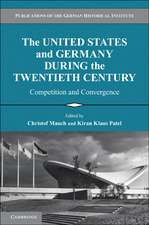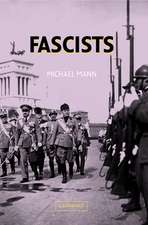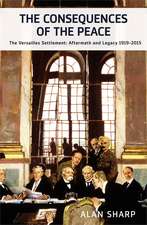Antifascist Humanism and the Politics of Cultural Renewal in Germany
Autor Andreas Agocsen Limba Engleză Paperback – 12 iun 2019
| Toate formatele și edițiile | Preț | Express |
|---|---|---|
| Paperback (1) | 281.30 lei 6-8 săpt. | |
| Cambridge University Press – 12 iun 2019 | 281.30 lei 6-8 săpt. | |
| Hardback (1) | 461.35 lei 3-5 săpt. | +25.60 lei 6-10 zile |
| Cambridge University Press – 13 iul 2017 | 461.35 lei 3-5 săpt. | +25.60 lei 6-10 zile |
Preț: 281.30 lei
Nou
Puncte Express: 422
Preț estimativ în valută:
53.83€ • 58.65$ • 45.36£
53.83€ • 58.65$ • 45.36£
Carte tipărită la comandă
Livrare economică 23 aprilie-07 mai
Preluare comenzi: 021 569.72.76
Specificații
ISBN-13: 9781108707695
ISBN-10: 1108707696
Pagini: 218
Ilustrații: 9 b/w illus.
Dimensiuni: 153 x 230 x 12 mm
Greutate: 0.3 kg
Editura: Cambridge University Press
Colecția Cambridge University Press
Locul publicării:New York, United States
ISBN-10: 1108707696
Pagini: 218
Ilustrații: 9 b/w illus.
Dimensiuni: 153 x 230 x 12 mm
Greutate: 0.3 kg
Editura: Cambridge University Press
Colecția Cambridge University Press
Locul publicării:New York, United States
Cuprins
Introduction: antifascist humanism and the dual legacies of Weimar; Part I. Defending the 'Other Germany': 1. The humanist front: antifascism and culture wars, 1934–9; 2. 'Otra Alemanias': antifascist humanism in the diasporam, 1939–44; 3. The 'other Germany' from below: antifascist committees and national renewal in 1945; Part II. Contesting 'Other Germanies': 4. Antifascism as renewal and restoration: the cultural League for the democratic renewal of Germany, 1945–6; 5. Humanism with a socialist face: Sovietization and 'ideological coordination' of the Kulturbund, 1946–7; 6. The limits of humanism: cultural renewal and the outbreak of the Cold War, 1947–8; 7. Mass organization and memory: antifascist humanism in divided Germany, 1948 and beyond; Conclusion: from the Saar to Salamis.
Recenzii
'Agocs has written a timely overview of the original 'antifa' cultural movements of the 1930s and 1940s in Europe and the Americas. Alarmed by the rise of Nazism and Italian Fascism, groups and intellectuals ranging from communists to liberals organized as exiles to counter the threat of fascism by promoting 'cultural humanism', based on ideas of the freedom of thought and religion and progressive Enlightenment views. Writers, artists, and intellectuals ranging from Thomas Mann to German communists who had fled to Mexico City published broadsides; organized under the sponsorship of the German Communist Party, the Free Germany movement, and through a variety of activities; and hoped to convey another, better Germany than the country that existed under the Third Reich. … Recommended. Upper-division undergraduates and above.' M. Deshmukh, Choice
'… Andreas Agocs has written an empirically focused, analytically wide-ranging study of the Cultural League for the Democratic Renewal of Germany (Kulturbund), a self-consciously antifascist organization that surfaced amid the ruins of Nazism in 1945.' Sean A. Forner, The American Historical Review
'… Andreas Agocs has written an empirically focused, analytically wide-ranging study of the Cultural League for the Democratic Renewal of Germany (Kulturbund), a self-consciously antifascist organization that surfaced amid the ruins of Nazism in 1945.' Sean A. Forner, The American Historical Review
Notă biografică
Descriere
This study traces German traditions of cultural renewal from their beginnings in antifascist activism to their failure in the emerging Cold War.














